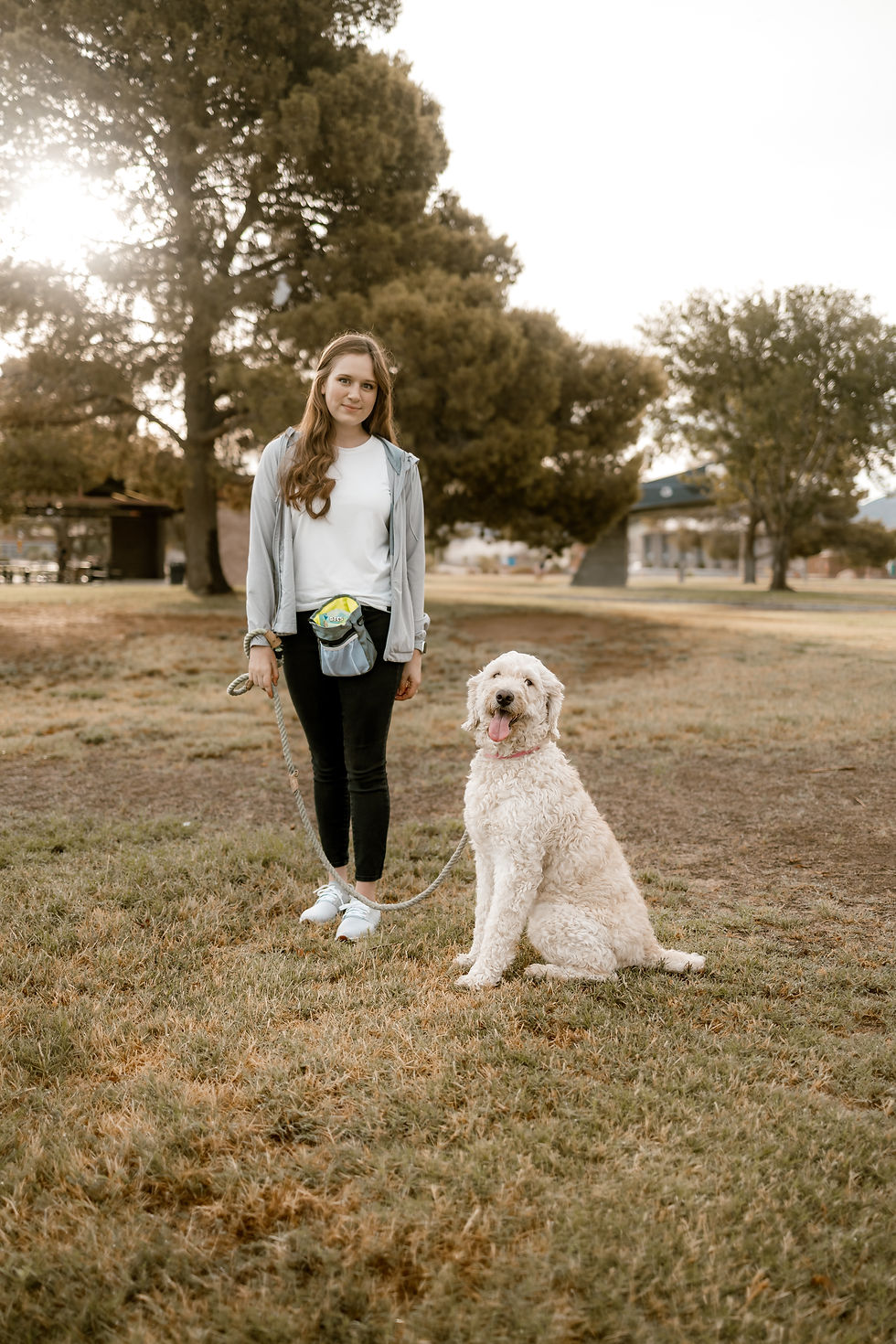5 Surprising Ways a Reactive Dog Can Impact Your Life
- Jul 3, 2023
- 5 min read
Having a reactive dog is a journey filled with challenges, but its impact goes beyond having a barking dog. It can significantly affect various aspects of our lives that those without reactive dogs may not fully comprehend or expect.

My dog, Murphy, has been both reactive and epileptic since I brought him home. While there are silver linings in that it led me to become a dog trainer, it's so important to acknowledge the immense effort and countless tears that come with having a reactive dog.
He turned out to be different from what I had envisioned. It broke my heart to see him struggle, and it was frustrating not being able to simply "fix" him. Realizing that he wasn't broken, and this was just simply the dog he is, was a tough pill to swallow. However, since accepting this fact, he now leads a happier life in a more structured environment.
Getting to that mindset wasn't easy. It required numerous trials and errors, financial investments, and significant stress before I became a dog trainer. Prior to owning Murphy, I had never even heard the term "reactive dog," let alone understood its far-reaching implications. We couldn't bring him to the dog park with friends, have other dogs or kids visit our house, or be around our baby relatives. Going on vacation became a challenge without a detailed set of rules for Murphy and someone we trusted to follow them.
Please note that I'm not complaining about the difficulties; instead, I want to convey that "I get it."
1. Emotional Fatigue
Dealing with a reactive dog can take a toll on your emotional well-being. The constant need for vigilance, anxiety, and stress in managing challenging situations can leave you emotionally exhausted. Even when I'm not with Murphy, I find myself constantly scanning the environment and being cautious of off-leash dogs. It saddens me when I see dog-filled cities during vacations without my dogs, knowing that Murphy wouldn't thrive there. Paradoxically, I also feel guilty for feeling relieved not to worry about Murphy when I travel without him. Recognizing this fatigue as a normal response is crucial, and it's important to prioritize self-care. Seek support from understanding friends, family, or online communities that can lend a listening ear or offer virtual support.
2. Social Limitations
Having a reactive dog can significantly impact your social life and activities. Spontaneous outings, walks, or gatherings with friends may become more challenging or limited. The fear of triggering reactive behavior can lead to social isolation or the need to avoid situations that others find enjoyable. Striving for balance is essential. Look for dog-friendly environments or activities, gradually desensitize your dog, and celebrate every step of progress. I often suggest my clients take walks or hikes without their reactive dogs to enjoy these activities and take a mental break.
3. Strained Relationships
There are so many ways this can cause strained relationships. Sadly, there are people I don't interact with as much anymore because of Murphy. It wasn't Murphy's fault, it was more so that we disagreed on the best way to humanely treat reactivity. I didn't want to hit my dog to "snap him out of it" and this led to them feeling I was too weak to be a dog trainer. Additionally, having a reactive dog may cause conflicts among humans living together, particularly if they don't share the same approach to training and management. Establishing a set of rules regarding your reactive dog, ensuring everyone follows them, and communicating openly can alleviate tensions.
The presence of a reactive dog can strain other relationships, too. Fear or aggression towards other animals can create conflicts and tension, especially if they live in the same house. It's crucial to carefully manage interactions, seek professional guidance if necessary, and ensure the well-being and safety of all pets involved. Implementing methods such as gates, leashes, and crates can help prevent scuffles.
4. Impact on Loved Ones
Living with a reactive dog can affect your family members, roommates, and even neighbors. The added responsibilities and stress can be shared among those around you. Open and honest communication is key. Keep your loved ones informed about the challenges you face and involve them in the training and behavior modification process. Building a support system will benefit not only you but also strengthen the bond between your loved ones and your dog. If it becomes overwhelming, consider seeking the help of mental health professionals and science-based, humane dog trainers well-versed in the LIMA methodology.
5. Financial Consequences
Caring for a reactive dog can lead to unexpected financial consequences in addition to the standard costs of dog ownership. Here are a few potential expenses to consider:
Extra Fees for Dog Sitting or Boarding: Reactive dogs may require specialized care when you're away or unable to be with them. Traditional dog boarding facilities may not be suitable due to their reactive behavior. In such cases, you may need to seek out professional dog sitters or boarding facilities experienced with reactive dogs, which often come with additional fees to ensure your dog's safety and well-being.
Extra Fees for Special Veterinary Visits: Reactive dogs may require more frequent veterinary visits or specialized care, including behavior consultations, medication management, or regular check-ups to monitor their progress. These additional appointments and treatments can contribute to higher veterinary expenses.
Limited Access to Public Parks: Reactive dogs may struggle in public settings, making it challenging to enjoy outings to public parks or busy areas. Exploring alternative options for exercise and mental stimulation, such as services like Sniffspot that offer private and secure spaces for dogs to play, may incur costs per session or subscription fees.
Training and Behavior Modification Costs: Collaborating with professional trainers or behaviorists who specialize in reactive dogs is crucial for managing their behavior effectively. Factor in the cost of hiring a qualified professional for training sessions or behavior modification programs into your budget.
Insurance or Liability Coverage: Depending on the severity of your dog's reactivity, you may need to consider liability insurance or an umbrella policy to protect yourself financially in case of any incidents or accidents involving your dog. These additional insurance costs can provide peace of mind and safeguard you from potential legal and financial implications.
Penalties: If your dog escapes to chase another dog or human, you may have to pay a fine to the city if animal control picks your dog up. You may also be at risk of extra fines for noise complaints if your dog barks enough in neighborhoods where it can be heard by neighbors.
Having a reactive dog impacts more than just the dog itself. It touches most aspects of our lives, including our emotional well-being, social interactions, relationships, and personal energy levels. By recognizing and understanding these effects, we can approach our journey with empathy and prioritize self-care. Seek support, celebrate progress, and remember that you are not alone!
Here are resources you may find valuable if you live with a reactive dog:
The online community r/reactivedogs on Reddit
Positive Reinforcement and Fear Free training support groups on Facebook
Videos on reactivity by Zak George on YouTube, which provide an honest and clear depiction of making progress with a reactive dog
careforreactivedogs.com and the partner support Facebook group CARE for Reactive Dogs
The Cautious Canine by Patricia McConnel
If you are struggling with living with a reactive dog, please book a free consultation with me today and let's work together to create a happier and more harmonious life for you and your dog. Don't wait, take the first step towards a brighter future.




Comments